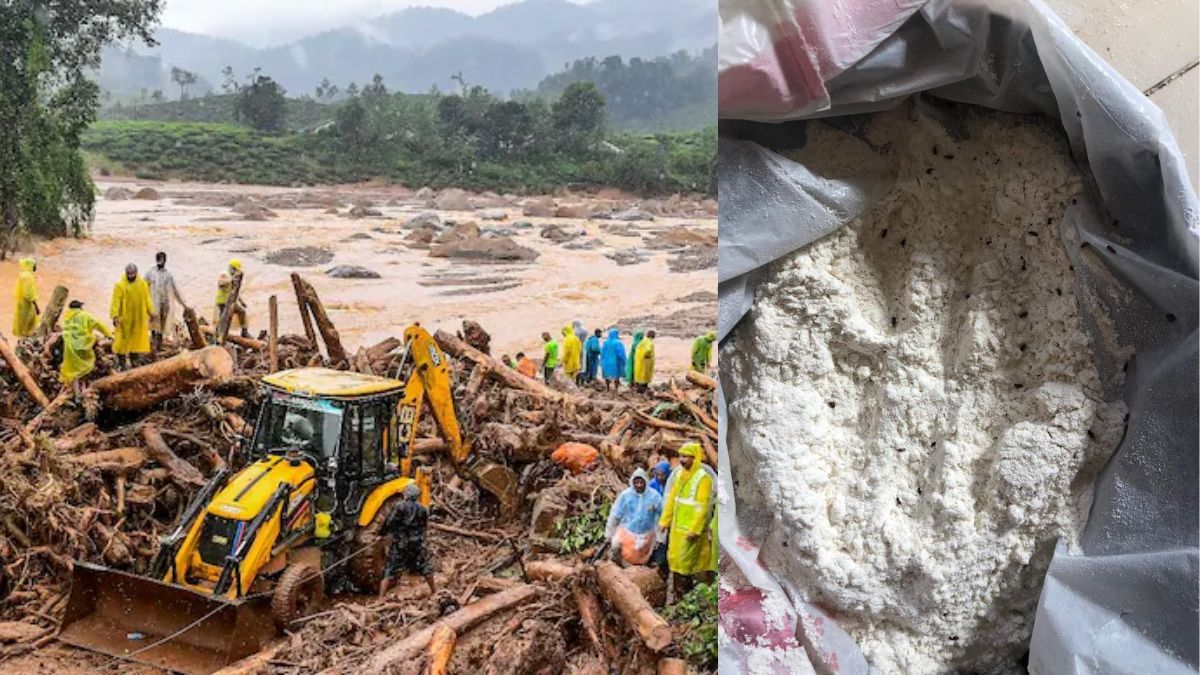Survivors of Chooralmala landslides accuse local authorities of negligence as contaminated food kits spark public outrage
Violent Outrage as DYFI Protests Over “Worm-Infested” Food Kits Distributed to Survivors.
Allegations of distributing worm-infested food kits to landslide survivors have provoked a violent protest in the Wayanad district, with locals decrying the perceived negligence of the Meppadi Gram Panchayat. Survivors of the devastating Chooralmala-Mundakai landslide expressed outrage over the quality of food distributed by the panchayat, reportedly governed by the Congress-led United Democratic Front (UDF). On Thursday, the youth wing of the DYFI led an intense protest that escalated into clashes, marking another episode of government scrutiny over alleged inefficiency in disaster management.
Food Kit Controversy: Allegations, Complaints, and Political Tensions.
The incident began when DYFI activists, claiming the food kits were infested with worms, staged a sit-in outside the panchayat office. According to protesters, kits distributed to the affected families contained contaminated rice, rava, and atta, intended as essential supplies for those displaced by the landslide. Displaying the allegedly tainted food items in public, the activists attempted to draw attention to what they viewed as government negligence in crisis management.
Tensions peaked around 11:30 a.m. when DYFI members reportedly tried to storm the panchayat president’s office. Police officers and local panchayat members quickly intervened, leading to confrontations that left five individuals injured, including the panchayat president, K. Babu, and four other members. All five injured were later admitted to a nearby hospital.
The controversy has underscored underlying political and social tensions, with the DYFI accusing UDF members of mismanagement and neglect. Meanwhile, UDF leaders countered these accusations, suggesting that the protest involved not only physical force but also offensive remarks targeting the panchayat president’s caste. These allegations have yet to be verified independently but have already added fuel to an already heated issue.

Panchayat Denial and Claims of Mystery Surrounding Food Supply Sources.
While the protest continues to unfold, Meppadi panchayat authorities have denied any involvement in the supply of contaminated food kits. They claim that the kits were donated by the Revenue Department and other charitable organizations, supplied consistently over the past three months without incident. According to panchayat sources, the problematic kits reportedly came from the District Collectorate, with the first complaint lodged on October 29.
“We suspect there is more to this issue than meets the eye, especially as it has emerged during a by-election,” stated a panchayat member. He noted that the food kits have been in distribution for a while without complaints, suggesting that the sudden emergence of these allegations hints at possible political manipulation.
During the protest, DYFI members alleged that they were manhandled and harassed by the local panchayat authorities, which, according to them, speaks to the larger inefficiencies within the government’s management of the disaster relief process.
Negligence and Mismanagement: What This Incident Reveals.
This unfortunate incident sheds light on the challenges and alleged inadequacies of the local administration’s handling of disaster relief efforts. For survivors, receiving compromised food kits is a stark reminder of the quality control gaps and oversight issues that have plagued the distribution process since the landslide struck on July 30. For many, the incident has underscored the perceived lack of accountability in the administration’s approach to addressing the needs of the most vulnerable.
With large parts of the Chooralmala, Mundakai, and Punchirimattam villages affected, as well as sections of Attamala in Wayanad, the government’s response has been a topic of intense public scrutiny. According to government reports, the disaster claimed 231 lives, while 47 individuals remain missing. Despite the severity of the devastation, residents feel that government support has been inconsistent, with this recent food kit controversy amplifying public frustration.
Survivors and protesters alike are questioning how relief items, specifically donated to assist those in crisis, could arrive in such an unsatisfactory condition. For them, this issue represents a breakdown in governmental oversight, emphasizing the need for stricter quality control measures and better coordination between panchayat authorities and donors.

Government’s Role Under Fire: The Call for Accountability.
As the protests continue, pressure is mounting on the Congress-led UDF to investigate and address the allegations raised by the DYFI and landslide survivors. Many have called for a probe into the quality assurance practices followed in sourcing and distributing relief supplies, particularly given the recent controversy. The scandal has ignited a public conversation around the transparency and efficiency of government support in the aftermath of natural disasters.
This recent mishap has cast a shadow on the government’s reliability, especially in times of crisis, urging a reevaluation of current processes. For many affected families, this issue has become emblematic of a broader struggle for accountability and justice. As the protests in Wayanad rage on, it remains to be seen whether the authorities will take meaningful action to rectify the situation, restore public confidence, and ensure that relief efforts for landslide survivors are carried out with the urgency and care they rightfully demand.

